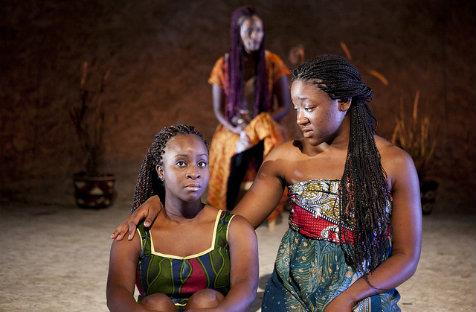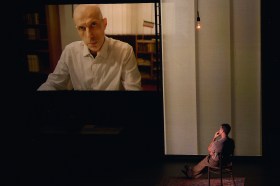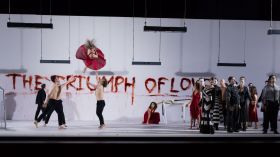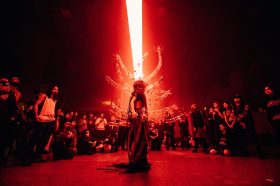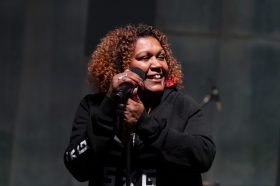The Baulkham Hills African Ladies Troupe tells the stories of four women who came to Australia between 1999 and 2004: Yarrie Bangura and Aminata Conteh-Biger from Sierra Leone, Yordanos Haile-Michael from Eastern Africa, and Rosemary Kariuki-Fyfe from Kenya. They are supported by three actors (Nancy Denis, Tariro Mavondo, and Effie Nkrumah) and two dancers (Eden Dessalegn and Lisa Viola) as well as singer-songwriter Aminata Doumbia in this new Belvoir production.
Writer and director Ros Horin, former Artistic Director of Griffin Theatre Company for 12 years, began her research for this project almost three years ago. Over two years of workshops, she asked the women many times whether they wanted to go on, even if they were able to go on, but they always felt it was worth it. The process of making the work was ‘extremely painful at times, as well as joyous and inspiring,’ Horin says.
And it is. Starting with an introduction to the women, accompanied by music and dance, the mood is infectious, like an African fiesta. The simple, yet warm African-inspired stage design by Dan Potra, winner of three Helpmann Awards, contributes to the festive atmosphere.
The women’s stories are told one by one, and soon we encounter a darker picture: Aminata was abducted at the age of 16 when rebels entered her home town of Freetown and held her hostage for several months. Yordy, orphaned at an early age, grew up in the army, unable to question her experiences, not knowing any different. She was later forced to leave her small daughter behind, travelling on foot through the Sahara to get to safety. Rosemary’s mother had so many children that she never had time to really talk to any of them. And when there’s no time to talk, who do you go to when you’re a child and your male relatives, elders you are supposed to respect, do things to you that you don’t even have words for? Yarrie was just seven years old when the civil war started in Sierra Leone, and vividly recalls fleeing past so many dead people, her feet ‘caked with gore’.
The women tell parts of their stories themselves, but as we get closer to their traumatic experiences, we move to other forms of storytelling. Some of it is told on video (video designer Mic Gruchy, film footage Justine Kerrigan); other parts are taken on by the whole troupe, each woman reading a small role. Sometimes a performer supports one of the women, and sometimes the roles are reversed, such as when Aminata questions a performer about her own experiences: ‘What did they do to you? How many were there? And then?’
The answers, often in graphic detail, are hard to listen to, and it’s even harder to imagine how much courage these four women must possess to be able to present their experiences on stage. It helps, and you imagine it helped the women, too, that they and the performers come together when trauma is remembered and re-lived, supporting each other, helping each other tell their stories. It’s as if they’re taking on part of the trauma as well, easing the burden of the woman who survived it.
The women’s stories are interspersed with music, video and dance, presenting another, more positive, joyful and often funny side of their lives: the markets, the gossip, hairdressing, cooking (‘The secret behind good cooking is lots and lots of onions,’ Rosemary explains), foods they miss, but also how they were made welcome in Australia, being helped by kind strangers at the airport, learning to ride an escalator, and how much it means to them to be free.
These four women make it clear why talking about ‘survivors’ rather than ‘victims’ of sexual violence isn’t just a matter of political correctness. When Yordy says she only began to understand that rape wasn’t the norm when she realised that cases of rape make the news in Australia; when Aminata insisted, after fleeing Sierra Leone, on going to a place where nobody knew her, where nobody would even be able to imagine what might have happened to her; when they tell you that some of their languages don’t even have a word for rape – that’s when you begin to fathom just how hard these four have fought to take their lives back.
And taken them back they have: Yarrie is attending university and a volunteer for Amnesty International Australia; Aminata is an Ambassador for UNHCR Australia and working to reduce childbirth mortality in Sierra Leone; Yordy is a small business owner and, through incredible courage and tenacity, found her daughter again after more than a decade; Rosemary works as a multicultural community liaison officer for NSW Police and was Parramatta Council’s 2012 Citizen of the Year.
Early on, one of the performers quips: ‘If we keep this up, they might move us upstairs’. And they should. The Baulkham Hills African Ladies Troupe deserves to be seen by a wide audience across Sydney, across Australia, including and especially everyone who ever thought of refugees as just a burden to this country. Because even more than shock, anger, admiration and inspiration, what you take away from this evening is gratitude: gratitude that these strong and amazing women continue to be brave enough to share their stories; gratitude that you’re allowed a glimpse into their journeys, as harrowing as they often have been; gratitude that you had a chance to meet them, to encounter their courage and dignity, and to come away better and richer for it.
Rating: 4 stars out of 5
The Baulkham Hills African Ladies Troupe
A co-production with Racing Pulse Productions & Riverside in association with STARTTS
Performers & Devisors: Yarrie Bangura, Aminata Conteh-Biger, Yordanos Haile-Michael and Rosemary Kariuki-Fyfe
Actors: Nancy Denis, Tariro Mavondo and Effie Nkrumah
Singer: Aminata Doumbia
Dancers: Eden Dessalegn, Lisa Viola
Writer & Director: Ros Horin
Producer: Michelle Kotevski
Associate Director/Movement: Lucia Mastrantone
Set Designer: Dan Potra
Video Designer: Mic Gruchy
Associate Designer & Costume: Emma Kingsbury
Songwriter: Aminata Doumbia
Musical Director & Composer: Basil Hogios
Lighting Designer: Nicholas Rayment
Sound Designer & additional music: Steve Toulmin
Filmmaker: Justine Kerrigan
Dramaturgs: Yana Taylor, Natalia Savvides
Downstairs Theatre, Belvoir, Surry Hills
15 August – 15 September
Image from Parramatta season by Lisa Tomasetti
